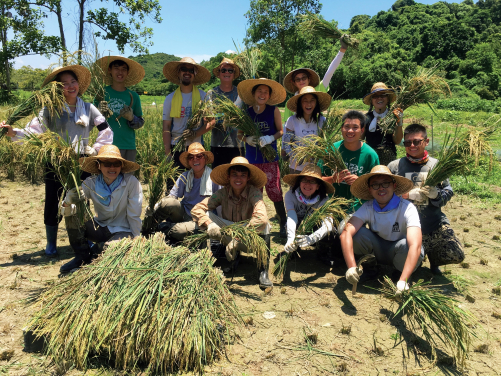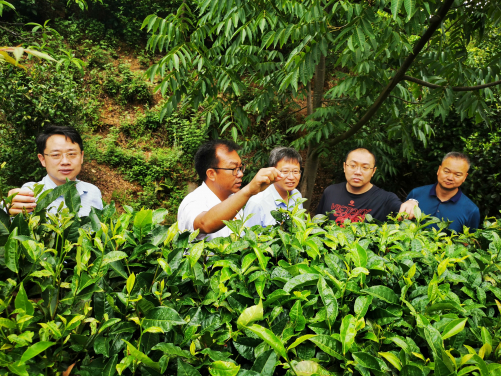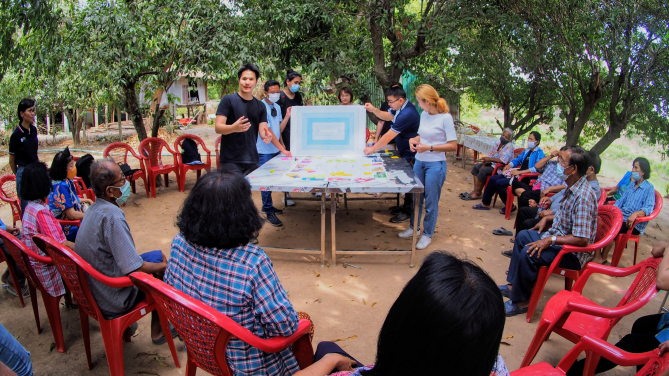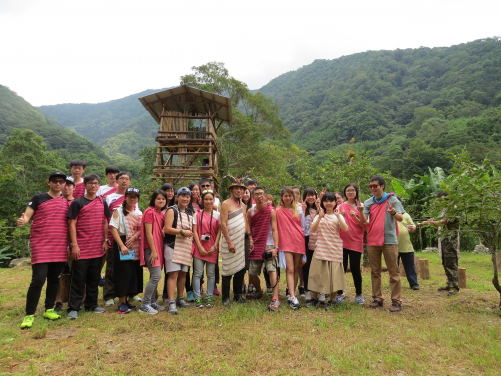Media
Rural Sustainability Programme – APAC Initiative for Regional Impact (AIRI) Holds Inaugural Regional Roundtable
26 Jun 2022

University staff, villagers, farmers, volunteers and NGO members work together to revitalise rural villages.

A plantation site visit in the village was conducted for attendees to learn about local agricultural development.
- 1 / 4
- 2 / 4
- 3 / 4
- 4 / 4
Gathering Academics from Mainland China, Taiwan, Hong Kong and Thailand
to Share Rural Sustainability and Challenges in Asia
Reinforces Regional Partnership through the Introduction of AIRI Urban-Rural Sustainability Fellowship 2022-23
The Rural Sustainability Programme – APAC Initiative for Regional Impact (AIRI) initiated by the Centre for Civil Society and Governance (CCSG) of The University of Hong Kong (HKU) and supported by The Hongkong Bank Foundation organised its first Regional Roundtable, gathering over 180 participants online across Asia-Pacific, including academics and practitioners from Mainland China, Taiwan, Hong Kong, and Thailand to share their experiences under the topic “Rural Sustainability – Critical Issues in Asia” to address the rooted problems of depopulation and environmental deterioration as well as explore the potential of an Asia-Pacific model for rural sustainability to support each region in combatting the challenges. The one-year incubation programme, AIRI Urban-Rural Sustainability Fellowship 2022-23, was also announced at the event to call for keen individuals in the region who aspire to be change fellows to steer urban-rural integration.
Cross-region sharing on Rural Revitalisation and Strategies to address local challenges
Peri-urban areas in the Asia-Pacific region are at a critical juncture of their development. While rural communities are facing problems of depopulation and environmental deterioration, they also come with invaluable opportunities for cross-region collaboration to address climate change, food and water security, and other sustainability challenges. In the opening remarks, Professor William Hayward, Dean of Social Sciences, The University of Hong Kong shared, “AIRI is a proud extension and scaling up of our Rural Sustainability programme at Lai Chi Wo, where the great work has been recognised by the UNESCO Asia-Pacific Awards for Cultural Heritage Conservation in 2020. The AIRI programme aims to build regional networks of action-research institutions and change-fellows for the attainment of rural sustainability in Asia-Pacific. We are very pleased to have the School of Public Policy and Management of Tsinghua University, University Outreach Office of National Chengchi University, and Department of Development and Sustainability of Asian Institute of Technology join forces with us and be the founding members of the regional consortium. Each of the consortium members plays the role of an intermediary and further engages its local and international partners for the attainment of rural sustainability. This “network of networks” design enables us to reach out to key stakeholders and collaborators in the region to gather energy and momentum for knowledge generation, dissemination, and application.”
To foster knowledge exchange and inspire regional partnership for rural sustainability, four thematic presentations in the areas of collaborative governance, rural-based economy, sustainable agriculture, and decentralisation of decision-making in rural resources were delivered by the participating regions with case studies from Hong Kong, Mainland China, Taiwan, and Thailand.
Following the thematic presentations with each region sharing their invaluable experiences in implementing rural revitalisation projects, a roundtable discussion shed light on how integrating governance and management mechanisms can help resolve hurdles in rural revitalisation. The session also examined how to scale up innovative rural revitalisation projects to drive a bigger impact.
Professor Wai-Fung Lam, Director of Centre for Civil Society and Governance, The University of Hong Kong, concluded the session by saying: “From today’s event, we have heard many challenges that rural communities in the region are facing nowadays; depopulation, environmental degradation, cultural identity crisis, and many other challenges are all testing the resilience of the communities. However, there is a beacon of hope that by forging cross-sectoral collaboration, these challenges can be addressed. Many successful revitalisation models that our speakers have shared are built upon innovations in collaborative governance that present new ways of managing, mobilising, and leveraging rural capital and resources for rural sustainability; these models challenge us to re-think the roles that urban dwellers and rural residents could play in attaining a sustainable society, and to align policy priorities in pursuit of urban-rural complementarity.”
Launch of the AIRI Urban-Rural Sustainability Fellowship 2022-23 for keen individuals to step up and drive long-term impact
In light of the need for joint effort in combating rural sustainability challenges in the region, the AIRI Urban-Rural Sustainability Fellowship 2022-23, a one-year incubation programme, jointly organised by the four partnering universities, was launched. The Fellowship aims to empower and connect thought leaders and practitioners from across the Asia-Pacific region who aspire to be the change leaders steering urban-rural integration and rural sustainability in the peri-urban context. The programme entails both online and experiential learning where renowned university professors and international experts in the fields of rural governance and economy, conservation and resource management, social innovation, and community revitalisation will offer a tailored incubation programme to equip the change fellows with the knowledge and skills required to address rural sustainability challenges in the region. Fellows who have completed the programme are eligible to enter into a rural sustainability proposal competition. Four winners from the cohort will be awarded with a seed grant for the pursuit of their revitalisation ideas.
The fully-sponsored programme encourages individuals who want to bring sustainability changes to rural communities to apply, including but not limited to graduate students, government officials, community practitioners, social workers, social investors, managers at farming co-ops and so on. Programme application begins now and will end in August 31, 2022. Please visit the programme website at https://ccsg.hku.hk/airi/fellowship for application details.
Please click here to see the high resolution photos.
For enquiries, please contact:
Centre for Civil Society and Governance, The University of Hong Kong
Ms. Mimi Kan (Tel.: 3910-2535; Email: mimikan@hku.hk)
About APAC Initiative for Regional Impact (AIRI):
Following the success of the Sustainable Lai Chi Wo (2013-2017) and HSBC Rural Sustainability (2017-2022) programmes, which have demonstrated the viability and merits of a community-based, integrated approach to rural revitalisation as a solution to sustainability challenges, the Centre for Civil Society and Governance at the University of Hong Kong proposes the APAC Initiative for Regional Impact (AIRI). Supported by The Hongkong Bank Foundation, AIRI aims to create action momentum for long-lasting rural sustainability in Asia-Pacific through the establishment of a regional infrastructure and build capacities among those keen stakeholders and change fellows, including university intermediaries, local and international for-benefit institutions and individual talents.
The project contributes to the attainment of the 2030 United Nations Sustainable Development Goals, particularly the SDG 17, on strengthening the global partnership for sustainable development. It scales up the impact of knowledge and incubation experiences from rural sustainability programmes in the region and also recruits and connects change agents, thought leaders and exceptional practitioners to explore the potential of an Asia-Pacific model for rural sustainability. To find out more information about APAC Initiative for Regional Impact (AIRI), please visit︰ https://ccsg.hku.hk/airi/
About the Centre for Civil Society and Governance of The University of Hong Kong:
Established in December 2002, the Centre for Civil Society and Governance (the Centre) strives to enhance our knowledge of civil society and its contribution towards good governance, and to facilitate the attainment of a sustainable society through forging community-based, innovative solutions to inform policy deliberation and collective actions. The work of the Centre is organised around three Labs—the Policy for Sustainability Lab (PSL), the Social Entrepreneurship and Civic Action Lab (SECAL), and the Nonprofits and Philanthropy Lab (NPPL); each of them representing a research focus and an area of excellence of the Centre. To find out more information about the Centre, please visit︰ https://ccsg.hku.hk/


